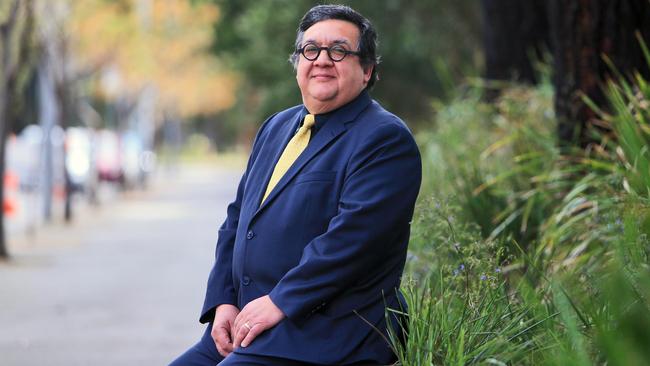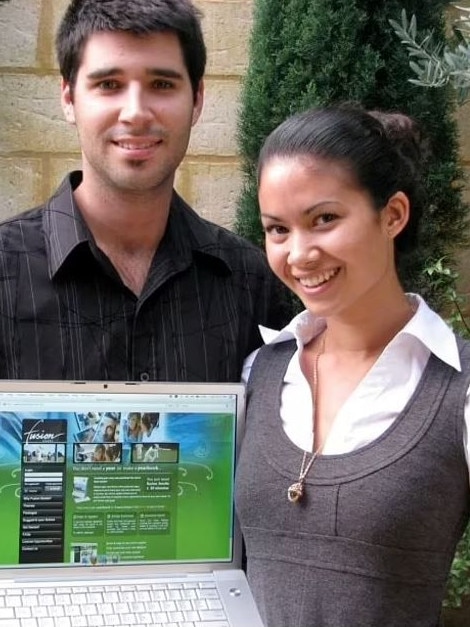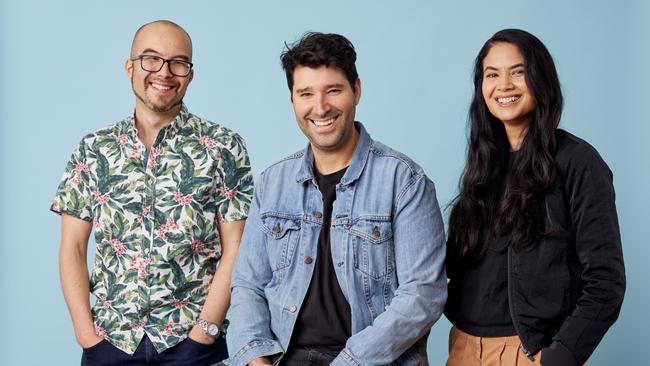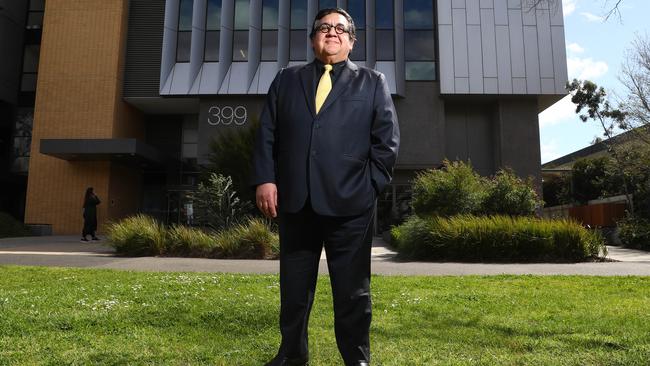Daring start-up strategy pays off as Hostplus cashes in on Canva
Super fund Hostplus has made around $1.9bn from an outlay of just $94m on the graphic design company Canva, and insists it wasn’t just a lucky punt.

Meet the super fund that’s made a massive windfall on Australia’s hottest tech stock, Canva.
Hostplus has made around $1.9bn from an outlay of just $94m on the graphic design company.
But its veteran chief investment officer, Sam Sicilia, says his fund’s stake has not been a matter of luck.
“It’s easy to say we got lucky with Canva,” he says in an interview with The Australian.
“But it has come from 21 separate investments along the way since 2015 valued at an average of just over $4m each.” It was not, as he says, just a matter of flipping a coin.
Hostplus’s total stake in Canva – which is held directly and through three venture capital funds, Blackbird Ventures, Square Peg Capital and Airtree Ventures – is valued at $1.6bn based on recent transactions in shares of the unlisted company.
All this was acquired at a total investment of just $94m over the years since 2015 – and after selling down its stake in the company by almost $300m in recent years.
Sicilia is full of admiration for Canva founders Melanie Perkins and husband Cliff Obrecht.
“When you think about it, they started off with the proposition of designing school year books and then a few steps later they are saying they want to take on Microsoft Office,” he says.
It’s impossible to say what Canva could be valued at if it listed on the US Nasdaq as has been mooted, potentially later this year or early next year.
Sicilia argues that a stockmarket listing is not necessary to put a value on the company.
“Almost 90 per cent of the world’s assets are privately held,” he says.
“In any case, the current Canva valuation was recently validated, given there was a transaction where incoming investors paid the current valuation price.”

While Sicilia does not want to discuss Canva’s potential IPO, he is pleased that his long-term enthusiasm for venture capital in general, and Canva in particular, is already paying off.
Sicilia has long been an enthusiast for having some of the fund’s portfolio in venture capital.
He has been criticised for Hostplus’ exposure to unlisted assets – including the timeliness of their valuations and impact on fund liquidity.
But he argues that Hostplus’s membership – a younger demographic in the hospitality and leisure industry – allows the fund to have a longer term investment horizon than other funds with older memberships, a horizon that can take a bit more risk for the potential reward.
Sicilia argues that putting some of the fund’s money in venture capital – its venture capital exposure is now around 3 per cent of its total assets – gives it potential upside if one of its investments hits it out of the park.
Getting in early
Sicilia talks about backing inventors and entrepreneurs who have plans, some of them crazy, including the ideas of US entrepreneur Peter Thiel, a co-founder of PayPal and an early investor in Facebook, in his book Zero to One.
“He talks about the intersection of a ‘good idea and a crazy idea”, says Sicilia in an interview with The Australian.
“It’s that intersection which causes the disruption,” he says.
“There are plenty of people who said that the idea of people not staying in hotel rooms and staying in people’s private homes (aka Airbnb) was outrageous and was never going to work.
“If you start off with this mentality, all you get is the status quo. You never get disruption.
“But the world is full of ongoing disruption.
“The reason we invest in venture capital is because the 5 per cent of our portfolio (it is now 3) could end up disrupting the other 95 per cent of our portfolio.”
Sicilia stoutly defends his fund’s policy of using external managers for its investments, and not following the strategy of funds like AustralianSuper by internalising investments.
He says Hostplus would prefer to use the investment expertise of external managers and has been able to negotiate some good fees with managers over time, particularly as some of the big super funds take their money away.
He says this is particularly the case with investing in thousands of small start-ups.
“We are a $115bn fund now. We can’t take up board time with little $1m investments. So we give bulk funding to the Blackbirds and the Square Pegs of the world and let them strut their stuff.”

The strategy sees eternal fund managers participating in successive fundraisings by a start-up.
It also sees Hostplus make investments on its own account, when a fund manager it is backing provides an opportunity to co-invest in a fund raising, as it has done with Canva.
“We have had the discipline to say that the company (Canva) is still growing and we’re going to give them more money (through external managers), if they meet their milestones,” Sicilia explains.
“Then Blackbird comes along and says: ‘We are putting in some more money, would you join us in a co-investment?’ ”
He says the fund’s total holding in Canva is a result of 21 different investment decisions since 2015, not some lucky flipping of a coin.
“We did two in 2015, one in 2016, one in 2017, one in 2018, three in 2019, four in 2020, and one in 2022 as a result of the merger with Statewide (and others), “ he says, explaining the strategy.
The average investment was just over $4m.
“The first time we invested, Canva was valued at $US150m,” he recalls. “The last time we invested it was valued at $US6bn.”
Investment calls
Sicilia says it will be up to individual fund managers to decide what to do with their stakes in Canva if it decides to list.
“Our managers decide whether to participate in a portfolio company IPO or trade sale,” he says. “We will be glad to accept whatever decision they make.”
It will be up to Hostplus to decide what it does with its direct stake, worth about $420m (Hostplus only made $31m in direct investments in Canva), and Sicilia says that will require hard-headed decisions.
“I don’t know what the circumstances are going to be at the time of the IPO,” he says.
“We can’t fall in love with these things. We have more than 4000 companies in our venture capital portfolios all up. There’s always a lot of activity happening. For most of them nothing happens for a long time. Some die off (AKA go bust) and others become good companies and others become wildly successful companies.”
He says Hostplus could find itself in a situation where it is investing in a company through a venture capital fund which decides to sell off when one of the investee companies lists, while another fund it uses buys in because they have become listed companies.
“Some (of Hostplus’s) portfolio companies move from private to public companies for a myriad of reasons, including access to capital markets,” he says. “Other portfolio companies choose to stay private for much longer (perhaps forever), while some others move from public to private companies, such as Sydney Airport.”

He points out that having reaped almost $300m from its $94m investment in Canva, Hostplus is in the comfortable position of already being over $200m ahead, even if the value of Canva was to go to zero overnight.
“It’s a nice story,” he says.
Sicilia wants to make it clear that investing in start-ups is a risky business. He says the process has seen Hostplus back companies, through its VC funds, and write off investments in some 400 companies.
“As shocking as that number might be, the total investments (written off) were worth just over $90m,” he says.
This represents about 5 per cent of the total funds Hostplus has invested in venture capital companies.
Hostplus’ exposure to unlisted assets has raised questions over its valuation methods, particularly in the Covid era when stocks plunged.
But he argues that it follows the valuations of the funds it invests through.
It has also seen critics raise concerns about its liquidity position if there is a need for short-term funds, such as during Covid when the government allowed fund members early access to some of their super.
Sicilia argues that despite the publicity, the fund’s exposure is only 3 per cent of total assets.
While there will still be some critics who are watching his strategy closely, its decision to back Canva at such an early stage will go a fair way to dispelling many of the criticisms.
In all, the fund has invested in over 20 VC companies which have become unicorns in addition to Canva, including Safety Culture, Culture Amp, Go1, Airwallex, Immutable, Linktree and Pet Circle.
Sicilia has been chief investment officer of Hostplus since March 2008.
When he first put to the board his interest in backing start-ups through VC funds, he says, he warned them that it could involve writing off some 12 per cent of total investments. “I told them that if they were not OK with that we should not be playing in that game,” he says. So far, the write-offs have only represented 5 per cent of Hostplus’s $2bn in drawn capital invested in start-ups. The board backed him, and the rest is history.






To join the conversation, please log in. Don't have an account? Register
Join the conversation, you are commenting as Logout